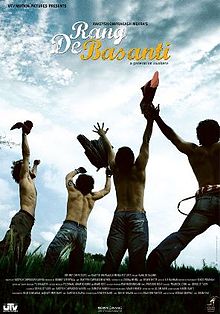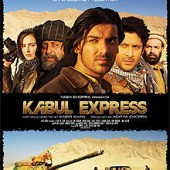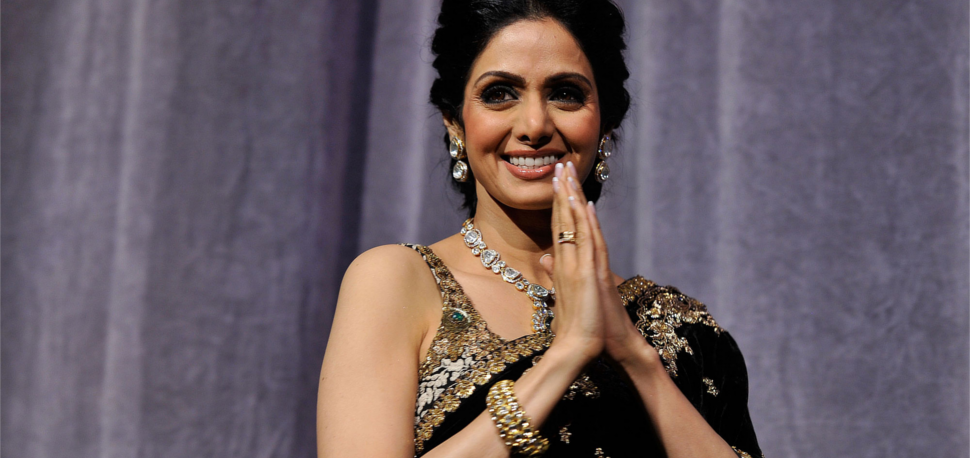A young, struggling British filmmaker Sue McKinley (Alice Patten) comes across the diary of her grandfather, Mr. McKinley (Steven Mackintosh), who served as a jailer in the Imperial Police during the Indian independence movement. Through the diary, she learns about the story of five freedom fighters who were active in the movement: Chandrasekhar Azad, Bhagat Singh, Shivaram Rajguru, Ashfaqulla Khan, and Ram Prasad Bismil. McKinley, in his diary, states that he had met two type of people in his life, those who died without uttering a sound and those who died with lots of anguish, crying over their deaths. McKinley reveals that it was then that he met with the third kind - those who die with a smile on their lips.
Having decided to make a self-financed documentary film about these revolutionaries, Sue travels to India, with the help of her friend, Sonia (Soha Ali Khan), from the Institute for International Studies at the University of Delhi. After a few unsuccessful auditions in search of the actors, Sue finally casts Sonias friends, four young men – Daljit DJ Singh (Aamir Khan), Karan Singhania (Siddharth Narayan), Aslam Khan (Kunal Kapoor) and Sukhi Ram (Sharman Joshi) — to portray the revolutionaries.Though they arent very enthusiastic at the idea of acting in a film about the independence movement, Sue eventually manages to convince them. Laxman Pandey (Atul Kulkarni), a right-wing political party activist, joins the cast later, despite initially being unpopular due to his anti-Western ideology, due to which he is often at odds with the other four, and anti-Muslim beliefs and contempt for Aslam Khan. In the process of filming, the idealism of Indias revolutionary heroes seeps into the protagonists.
They gradually begin to realize that their own lives are quite similar to the characters they portray in Sues film and that the state of affairs that once plagued the revolutionaries continues to torment their generation.Meanwhile, Ajay Singh Rathod (R. Madhavan), a flight lieutenant in the Indian Air Force who is Sonias fiancé, is killed when his jet, a MiG-21, crashes. The government proclaims that the crash was caused by pilot error and closes the investigation. Knowing that Rathod was an ace pilot, Sonia and her friends do not accept the official explanation.
Instead, they claim that he sacrificed his life to save hundreds of other lives that would have been lost had he ejected from the aircraft and left it to crash into a populous city. They investigate and learn that the crash was due to a corrupt defence minister (Mohan Agashe), who had signed a contract exchanging cheap and illegal MiG-21 aircraft spare parts for a personal favour. To their surprise, they learn that the key person who was responsible for organizing the deal was Karans father, Rajnath Singhania (Anupam Kher).Angered by the situation, the group and their supporters decide to protest peacefully at India Gate, a war memorial in New Delhi. Police forcefully break up their protest using batons; in the process, Rathods mother (Waheeda Rehman) is severely injured and slips into a coma.
DJ, Karan, Aslam, Sukhi, and Laxman decide that they must emulate the early freedom fighters and resort to violence to achieve justice. As a result, they kill the defence minister to avenge Rathods death, while Karan murders his father for his corrupt actions. The minister is reported to have been killed by terrorists and is hailed as a martyr by the media. To bring forth their intentions behind the killings, the five of them attempt to reach the public through a radio station. They forcibly take over the All India Radio station premises after having evacuated its employees.
Karan goes on air and reveals the truth about the defence minister and his wrongdoings. While still on the air, the police proclaim that they are dangerous terrorists who have forcefully taken over the AIR, and therefore they are to be shot on sight. The first to be shot is Daljit, who tries to get out of cover and establish that they are not terrorists. Sukhi, unable to control his anger, shows himself and is instantly shot. As they are trying to lock the terrace doors, Aslam and Pandey are then killed by a grenade and the once archenemies die holding hands and smiling, as they have visions of Ram Prasad Bismil and Ashfaqullah Khan.
Daljit manages to crawl to the recording room, where Karan is still on air. When Karan understands that he has been shot, they speak amongst themselves for the last time, regarding the others, about Sue and about Daljits love for her. They are then killed by police commandos while laughing. It is then revealed that McKinley described the third kind of people he came across as being the ones who embraced death as a friend and an equal, with a heartfelt laughter. After their death, the public reacts with outrage and expresses urge to bring Indian politics to justice, following the motives of all the boys.
The film comes to an end with Sue describing the impact of the boys on her life. As she and Sonia watch from the rooftop that Ajay proposed to her on, they have a vision of the boys running in the fields, singing happily and victoriously throwing their shirts in the air, acting as if they are celebrating life itself, as if the ebb of their once-there vitality still reverberates in the places where they once used to go, and a wave of melancholy comes over the two surviving women.In an afterlife-like state, the boys watch as a father tells his son (a young Bhagat Singh) about gardening. They watch over him with smiling faces, then depart as friends for eternity.Critics gave the film an overwhelmingly positive response, in particular the ensemble casts performance and credibility.
Although The Indian Express spoke positively of the cinematography and the films story, it noted that the message that the film carries with it tends to get diluted towards the climax. Praising the films cast for their performance and the cinematography of Binod Pradhan, Taran Ardash wrote that the film would be successful with the urban audiences. The Hindustan Times summarized the film as being a well-scripted, skilfully crafted [and] thought-provoking entertainer. Saisuresh Sivaswamy of Rediff.com wrote that films like Rang De Basanti can easily get into preachiness, but believed Mehra got his message across while avoiding this, also appreciating the music, cinematography, dialogues and art direction.
The Hindu credited Kamlesh Pandey for writing a story that would have been a difficult film to make, but it added by saying that the transformation of the youngsters into heroes seemed poetic. Although the screenplay, direction and the cast were also well-appreciated, the reviewer felt that Rahmans soundtrack lacked pace. The film also received positive reviews from critics outside India. The review from the BBC gave it the highest possible five star rating and added that it was an entertaining mix of romance, history and social commentary. The Bloomberg website wrote positively about the raw energy of a young cast and A.
R. Rahmans splendidly rousing soundtrack. Sight & Sound magazine conducts a poll every ten years of the worlds finest film directors to find out the Ten Greatest Films of All Time. This poll has been going since 1992, and has become the most recognised poll of its kind in the world. In 2012 Cyrus Frisch voted for Rang De Basanti.
Frisch commented: Corruption became the subject of fierce debate in India after the major success of this film among youngsters.
Director :
Rakeysh Omprakash Mehra
Cast :
Aamir Khan, Kunal Kapoor, Soha Ali Khan, Sharman Joshi, Atul Kulkarni, Madhavan, Alice Patten, Kirron Kher, Om Puri, Anupam Kher, Waheeda Rehman, Mohan Agashe
Genre :
Drama, Patriotic
Producer :
Rakeysh Omprakash Mehra
Ronnie Screwvala
Creative Producer:-
P. S. Bharathi
Release Date :
2006-01-26
Running Time :
157 minutes
Music :
A. R. Rahman











RIDDHIMAA
Howrah Bridge Pe Latakti Hui Lash
sharan
Movie Review: AE DIL HAI MUSHKIL (2016) - Bollywood's First Platonic Love Story
Sharad
Commando 2
amol
Force 2
Ultimate Free Lyrics
Rustom